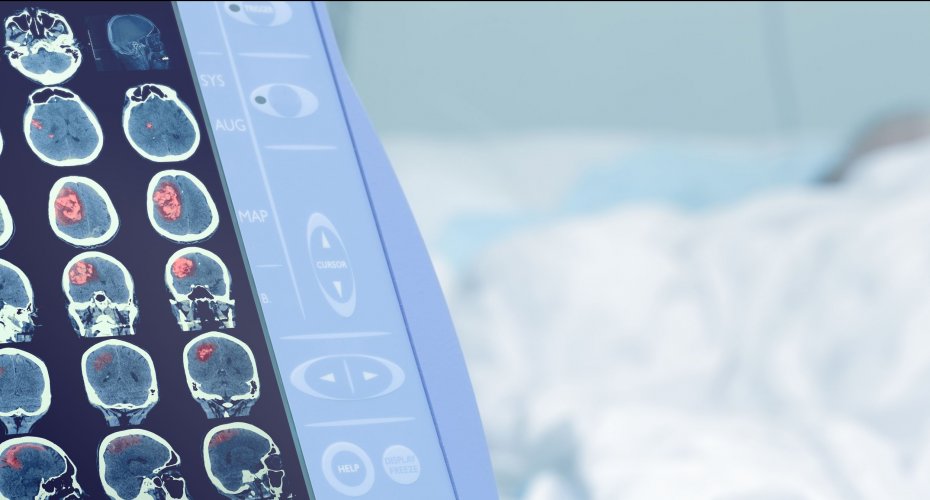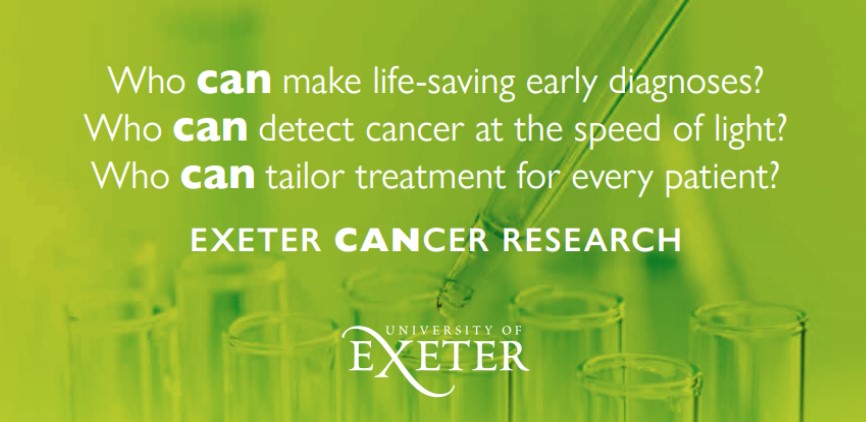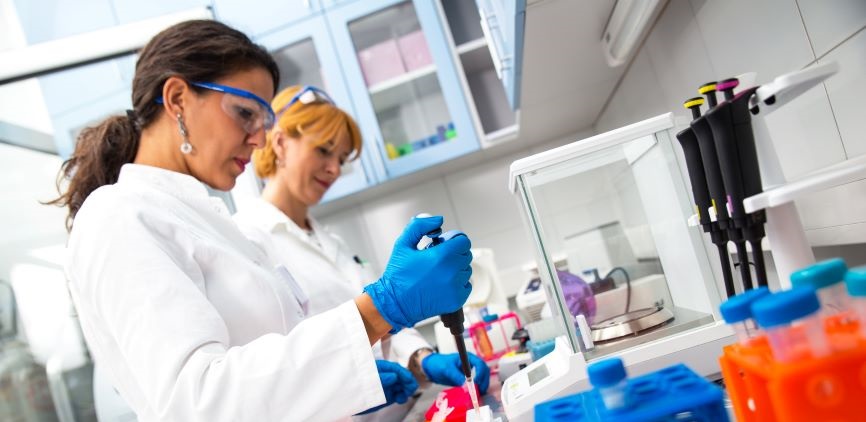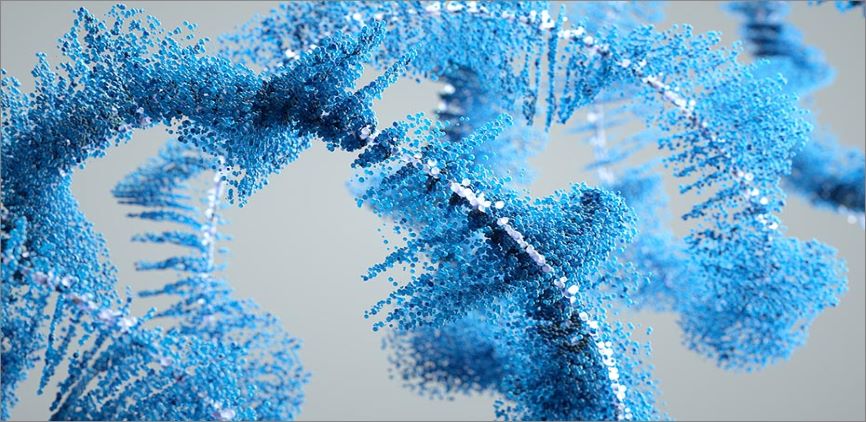A Healthier Future
The delicate balance of our highly populated world is at risk. There are myriad challenges undermining human health and wellbeing. Our modern lifestyles and ever-more crowded and interconnected world influence incidence of many chronic and infectious diseases. Mental health disorders are increasing at a worrying rate and health services are stretched, and less able to cope with growing health care demands.
The University of Exeter is tackling these global health challenges head on. We are training the next generation of innovators and expert health and care professionals and, through our close partnerships with the NHS, healthcare providers, industry and above all, the public, our innovative and cutting-edge research is highly relevant and brings transformational benefits to patient care.
Take a look at some of the big issues we are trying to solve.
How can we conquer cancer?

Cancer matters to us all. 1 in 2 people in the UK will get cancer yet our country's diagnosis times lag behind many others across the world. A shocking 90% of people eventually diagnosed with cancer see their GPs a year before with symptoms. And the longer someone has to wait for diagnosis, the worse their chances of survival. In fact, 100,000 people needlessly die from cancer in the UK each year, mainly due to late diagnosis.
There is an urgent need to provide more tailored information to GPs to enable them to diagnose potential cancers at the earliest possible stage, even before patients present with concerns. At Exeter we are pioneering new ways to diagnose cancer in primary care and new ways to treat effectively.
Professor Willie Hamilton's team has developed symptoms charts and software which are helping GPs save thousands of lives a year by spotting patients with the highest risk symptoms early. Dr Sarah Bailey is developing a simple £4 test to accurately identify those at risk of colorectal cancer.
In a recent trial, her FIT test, which picks up traces of blood in faeces, identified people who had cancer but only minimal symptoms.
Professor Chrissie Thirlwell is a leading expert in cancer genomics. By sequencing the genes in individual patient’s cancers, she can gain life-saving insights into how their cancer might progress and, crucially, what drugs will be the most effective. This personalised approach to treatment has a huge impact because a drug that is life-saving for one patient might be useless for another. Identifying new cancer-causing genetic mutations could also save lives in the future because each mutation is a potential target for a new treatment. One that could treat cancers for which there are few treatments today.
Why not watch or listen to our Alumni Matters conversation series chat with alumnus Dr Tanimola Martins (PhD, 2014)? Reflecting on World Cancer Research day, we spoke about why Tani was motivated to research the area of Ethnic inequality in Cancer Diagnosis and his current work. As well as discussing how large a scale the issue of ethnic inequality and diagnosis of cancer is, why it exists, and what can be done to reduce its impact.
How can we improve the lives of people with dementia?

It is imperative to address the growing global health challenge of dementia. There are currently more than 40 million people worldwide with Alzheimer’s disease and these numbers will increase to more than 100 million by 2050 (World Alzheimer’s report, 2016). In addition, it is estimated that at least 15% of people aged 60 or above have Mild Cognitive Impairment (MCI), and that between 8 and 15% of these will progress to dementia each year, most commonly to Alzheimer’s disease. Alzheimer’s is a devastating, progressive neurodegenerative disease with a massive personal and financial impact on individuals, families and society. As well as the immediate impact on the person and their family, there is also the cost of care and treatment. The total estimated worldwide cost of dementia is US$818 billion, and it is predicted to become a trillion dollar disease within this decade (World Alzheimer’s report, 2016).
In the last twenty years there have been no new pharmacological therapies licensed for the treatment of Alzheimer’s disease and we have no licensed pharmacological treatments for MCI. Although there are a handful of promising developments, globally, many major pharmaceutical companies are dis-investing or withdrawing from this space. With ageing populations and the rapidly increasing number of people with Alzheimer’s and MCI, increasing the pipeline to accelerate the development of effective treatments is an urgent priority. We must look at efficient and novel approaches to clinical trial design to enable us to create a pipeline that begins to address this challenge and deliver new and cost-effective therapies.
Our long-term vision is to drive forward and enable a multi-arm phase 2 clinical trial platform that will substantially increase the number of compounds moving forward in to clinical trials for dementia. Cutting-edge design elements will include simultaneously comparing three active drugs (in the first stage) with placebo, enrichment strategies, novel computerized cognitive assessments, and the use of FDG-PET as a key secondary outcome. These design elements will enable the trials to be far more cost-efficient than previous dementia trials. Each trial will be independent and will compare the respective active treatment with placebo.
How do we manage life-threatening diabetes?

Neonatal diabetes is typically diagnosed in babies within the first six months of life. In contrast to type 1 diabetes which is caused by autoimmunity, neonatal diabetes results from a change in single genes (a monogenic disorder) which are involved in keeping insulin-producing cells in the pancreas working properly. This genetic change results in life threatening diabetes soon after birth.
Ground-breaking international research, led by Professor Andrew Hattersley CBE at the University of Exeter made a landmark discovery in 2004: the team showed that around half of people with neonatal diabetes can stop insulin injections and be treated more effectively with tablets. This has revolutionised the life of individuals with this form of genetic diabetes. It eradicates the need to inject with insulin several times a day, providing a much less invasive treatment, and individuals have much better control of their glucose. The tablet may also prevent the onset of developmental delay in children, including muscle weakness, learning difficulties and epilepsy.
“Switching from regular insulin injections was life-changing for these people who had been on insulin all their life; many described it as “a miracle treatment.” - Professor Andrew Hattersley
In some lower income countries, insulin is in very short supply and a lack of it means that children with diabetes are unnecessarily dying from their condition. This simple blood test, provided by the University of Exeter, diagnoses the particular subtype of neonatal diabetes and identifies those children who will benefit from a much cheaper and less invasive treatment.
Our ability to offer free genetic testing is appreciated worldwide, with clinicians and families going to great lengths to get blood samples from their children to Exeter for screening. The service is absolutely essential for ensuring these children born with diabetes get the best possible treatment where ever they are in the world. We believe that geography should not be a barrier to accessing this diagnosis and treatment and we can only continue to offer this free test thanks to funding.
How you can help
Philanthropic donations are vitally important to Health and Life Sciences research, enabling Exeter’s leading team of scientists to drive innovation and make advancements to health and patient care.
Please contact Simon Tyson, Head of Development for Health and Life Sciences, for more information or to discuss your gift.
Cancer Research

A donation to our Cancer Fund can help revolutionise the prevention, diagnosis and treatment of cancer.
Donations large and small help fund everything from the state of the art equipment we need to sequence DNA and the brilliant researchers who run clinical trials, to the chemicals needed to develop diagnostic tests.
Dementia Research

A donation to our Dementia Fund will help us improve diagnosis, discover new treatments, recommend methods of prevention and transform care of people living with dementia, now and in the future.
Every donation will be directed to the area of greatest need to help solve one of the greatest global health challenges of our time.
Diabetes Research

A donation to our Diabetes Fund could be life-saving for children around the world. It will help ensure the correct diagnosis and treatment plus also support research that aims to bridge the gap between genetic discovery and cell based human therapy in type 1 diabetes.
Health Fund

A donation to our Medical and Health Research more widely could support our world-renowned researchers in the fight against global health challenges from antibiotic resistance, to heart disease, to COVID-19.
Quick links: Dementia Research | Mireille Gillings Neuroimaging Centre | Diabetes Research



